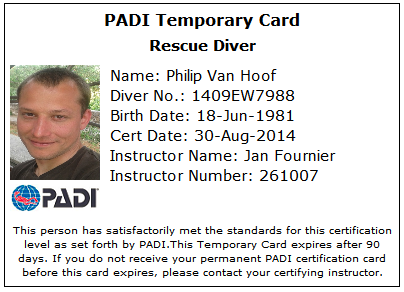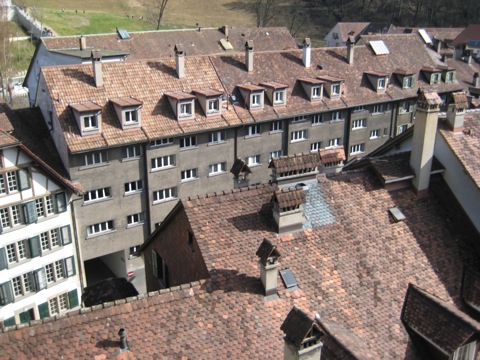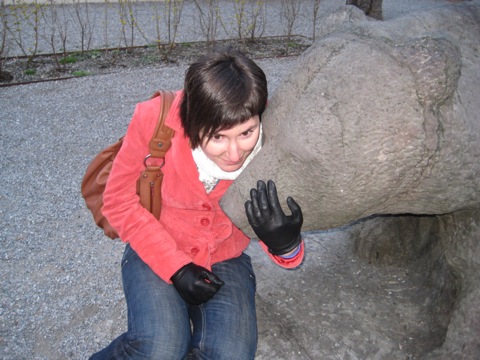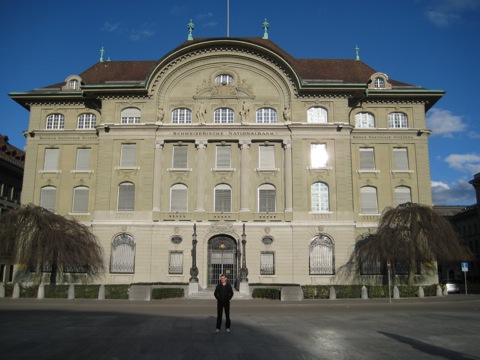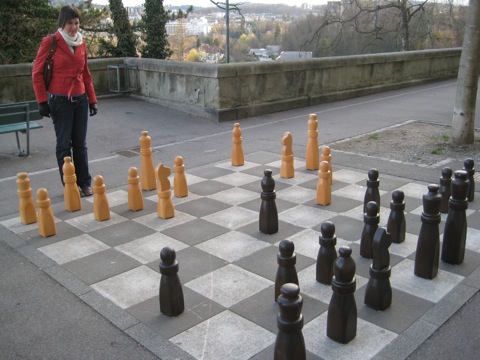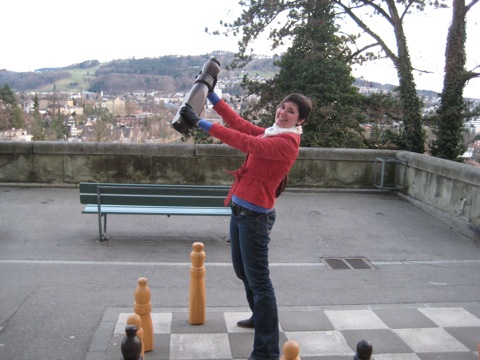For this one I worked really hard. Buddy breading, relaxing people in panic at 20 meters deep, keeping yourself cool. And that in Belgian waters (no visibility and freezing cold). We simulated it all. It was harder than most other things I did in my life.
Category: Personal
RE: Scudraketten
Wanneer Isabel Albers iets schrijft ben ik aandachtig: wij moeten investeren in infrastructuur.
Dit creëert welvaart, distribueert efficiënt het geld en investeert in onze kinderen hun toekomst: iets wat nodig is; en waar we voor staan.
De besparingsinspanningen kunnen we beperken wat betreft investeringen in infrastructuur; we moeten ze des te meer doorvoeren wat betreft andere overheidsuitgaven.
Misschien moeten we bepaalde scudraketten lanceren? Een scudraket op de overheidsomvang zou geen slecht doen.
Een week mediastorm meemaken over hoe hard we snoeien in bepaalde overheidssectoren: laten we dat hard en ten gronde doen.
Laten we tegelijk investeren in de Belgische infrastructuur. Laten we veel investeren.
Rusland
Dnsmasq’s code quality
Had to adapt dnsmasq’s code today. My god, that tiny application has a shitty code quality. I now feel bad knowing that so many systems are depending on this stuff.
Mr. Dillon; smartphone innovation in Europe ought to be about people’s privacy
Dear Mark,
Your team and you yourself are working on the Jolla Phone. I’m sure that you guys are doing a great job and although I think you’ve been generating hype and vaporware until we can actually buy the damn thing, I entrust you with leading them.
As their leader you should, I would like to, allow them to provide us with all of the device’s source code and build environments of their projects so that we can have the exact same binaries. With exactly the same I mean that it should be possible to use MD5 checksums. I’m sure you know what that means and you and I know that your team knows how to provide geeks like me with this. I worked with some of them together during Nokia’s Harmattan and Fremantle and we both know that you can easily identify who can make this happen.
The reason why is simple: I want Europe to develop a secure phone similar to how, among other open source projects, the Linux kernel can be trusted. By peer review of the source code.
Kind regards,
A former Harmattan developer who worked on a component of the Nokia N9 that stores the vast majority of user’s privacy.
ps. I also think that you should reunite Europe’s finest software developers and secure the funds to make this workable. But that’s another discussion which I’m eager to help you with.
In agreement
Surprisingly I’m in agreement with what Richard has to say in this specific context.
A use-case for SPARQL and Nepomuk
As I got contacted by two different companies last few days who both had questions about integrating Tracker into their device, I started thinking that perhaps I should illustrate what Tracker can already do today.
I’m going to make a demo for the public transportation industry in combination with contacts and places of interest. Tracker’s ontologies cross many domains, of course (this is just an example).
I agree that in principle what I’m showing here isn’t rocket science. You can do this with almost any database technology. What is interesting is that as soon as many domains start sharing the ontology and store their data in a shared way, interesting queries and use-cases are made possible.
So let’s first insert a place of interest: the Pizza Hut in Nossegem
tracker-sparql -uq "
INSERT { _:1 a nco:PostalAddress ; nco:country 'Belgium';
nco:streetAddress 'Weiveldlaan 259 Zaventem' ;
nco:postalcode '1930' .
_:2 a slo:Landmark; nie:title 'Pizza Hut Nossegem';
slo:location [ a slo:GeoLocation;
slo:latitude '50.869949'; slo:longitude '4.490477';
slo:postalAddress _:1 ];
slo:belongsToCategory slo:predefined-landmark-category-food-beverage }"
And let’s add some busstops:
tracker-sparql -uq "
INSERT { _:1 a nco:PostalAddress ; nco:country 'Belgium';
nco:streetAddress 'Leuvensesteenweg 544 Zaventem' ;
nco:postalcode '1930' .
_:2 a slo:Landmark; nie:title 'Busstop Sint-Martinusweg';
slo:location [ a slo:GeoLocation;
slo:latitude '50.87523'; slo:longitude '4.49426';
slo:postalAddress _:1 ];
slo:belongsToCategory slo:predefined-landmark-category-transport }"
tracker-sparql -uq "
INSERT { _:1 a nco:PostalAddress ; nco:country 'Belgium';
nco:streetAddress 'Leuvensesteenweg 550 Zaventem' ;
nco:postalcode '1930' .
_:2 a slo:Landmark; nie:title 'Busstop Hoge-Wei';
slo:location [ a slo:GeoLocation;
slo:latitude '50.875988'; slo:longitude '4.498208';
slo:postalAddress _:1 ];
slo:belongsToCategory slo:predefined-landmark-category-transport }"
tracker-sparql -uq "
INSERT { _:1 a nco:PostalAddress ; nco:country 'Belgium';
nco:streetAddress 'Guldensporenlei Turnhout' ;
nco:postalcode '2300' .
_:2 a slo:Landmark; nie:title 'Busstop Guldensporenlei';
slo:location [ a slo:GeoLocation;
slo:latitude '51.325463'; slo:longitude '4.938047';
slo:postalAddress _:1 ];
slo:belongsToCategory slo:predefined-landmark-category-transport }"
Let’s now get all the busstops nearby the Pizza Hut in Nossegem:
tracker-sparql -q " SELECT ?name ?lati ?long WHERE { ?p slo:belongsToCategory slo:predefined-landmark-category-food-beverage; slo:location [ slo:latitude ?plati; slo:longitude ?plong ] . ?b slo:belongsToCategory slo:predefined-landmark-category-transport ; slo:location [ slo:latitude ?lati; slo:longitude ?long ] ; nie:title ?name . FILTER (tracker:cartesian-distance (?lati, ?plati, ?long, ?plong) < 1000) }" Results: Busstop Sint-Martinusweg, 50.87523, 4.49426 Busstop Hoge-Wei, 50.875988, 4.498208
This of course was an example with only slo:Landmark. But that slo:location property can be placed on any nie:InformationElement. Meaning that for example a nco:PersonContact can also be involved in such a cartesian-distance query (which is of course just an example).
Let’s make an example use-case: We want contact details of friends (with publicized coordinates) who are nearby a slo:Landmark that is in a food and beverage landmark category, so that the messenger application can prepare a text message window where you’ll type that you want to get together to get lunch at the Pizza Hut.
Ok, so let’s add some nco:PersonContact to our SPARQL endpoint who are nearby the Pizza Hut:
tracker-sparql -uq "
INSERT { _:1 a nco:PersonContact ; nco:fullname 'John Carmack';
slo:location [ a slo:GeoLocation;
slo:latitude '51.325413'; slo:longitude '4.938037' ];
nco:hasEmailAddress [ a nco:EmailAddress;
nco:emailAddress 'john.carmack@somewhere.com'] }"
tracker-sparql -uq "
INSERT { _:1 a nco:PersonContact ; nco:fullname 'Greg Kroah-Hartman';
slo:location [ a slo:GeoLocation;
slo:latitude '51.325453'; slo:longitude '4.938027' ];
nco:hasEmailAddress [ a nco:EmailAddress;
nco:emailAddress 'greg.kroah@somewhere.com'] }"
And let’s add one person who isn’t nearby the Pizza Hut in Nossegem:
tracker-sparql -uq "
INSERT { _:1 a nco:PersonContact ; nco:fullname 'Jean Pierre';
slo:location [ a slo:GeoLocation;
slo:latitude '50.718091'; slo:longitude '4.880134' ];
nco:hasEmailAddress [ a nco:EmailAddress;
nco:emailAddress 'jean.pierre@somewhere.com'] }"
And now, the query:
tracker-sparql -q " SELECT ?name ?email ?lati ?long WHERE { ?p slo:belongsToCategory slo:predefined-landmark-category-food-beverage; slo:location [ slo:latitude ?plati; slo:longitude ?plong ] ; nie:title ?pname . ?b a nco:PersonContact; slo:location [ slo:latitude ?lati; slo:longitude ?long ] ; nco:fullname ?name ; nco:hasEmailAddress [ nco:emailAddress ?email ]. FILTER (tracker:cartesian-distance (?lati, ?plati, ?long, ?plong) < 10000) }" Results: Greg Kroah-Hartman, greg.kroah@somewhere.com, 50.874715, 4.49158 John Carmack, john.carmack@somewhere.com, 50.874715, 4.49154
These use-cases of course only illustrate the simplified location ontology in combination with the Nepomuk contacts ontology. There are many such domains in Nepomuk and when defining your own platform and/or a new domain on the desktop you can add (your own) ontologies. Mind that for the desktop you should preferably talk to Nepomuk first.
The strength of such a platform is also its weakness: if no information sources put their data into the SPARQL endpoint, no information sink can do queries that’ll yield meaningful results. You of course don’t have this problem in a contained environment where you define what does and what doesn’t get stored and where, like an embedded device.
A desktop like KDE or GNOME shouldn’t have this problem either, if only everybody would agree on the technology and share the ontologies. Which isn’t necessarily happening (fair point), although both KDE with Nepomuk-KDE and GNOME with Tracker share most of Nepomuk.
But indeed; if you don’t store anything in Tracker, it’s useless. That’s why Tracker comes with a file system miner and provides a framework for writing your own miners. The idea is that with time more and more applications will use Tracker, making it increasingly useful. Hopefully.
Morals? Forbidding stuff?
It isn’t freedom to have to choose for Richard Stallman’s world view. It isn’t ‘freedom’ to be called immoral just because you choose another ethic. It isn’t freedom when a single person or group with a single view on morality tries to forbid you something based on just their point of view.
For example, Stallman has repeatedly said about Trusted Computing (which he in a childish way apparently calls Treacherous Computing) that it ‘should be illegal’ (that’s a quote from official FSF and GNU pages). I also recall Stallman trying to forbid blog posts about proprietary software (it was about VMWare) on planet-gnome (original thread here).
Richard Stallman and some of his followers don’t seem to understand that it isn’t necessarily moral to impose your world view, about morality, on everybody else by claiming, for example, that the other’s view ‘should be illegal’ or ‘is immoral’ (these are terms that he and some of his followers frequently use).
Firstly something should be only illegal when all procedures for making a new law in a country have been followed. In most democratic countries that means getting a majority in parliament but also getting advise from your country’s judges and from experts in the field who’ll be affected by your new law. So not just by listening and following a guy like Richard Stallman blindly. This is why I was very much against a rule for planet-gnome to forbid posts about proprietary software that uses GNOME: nor the majority of GNOME foundation members nor all experts in the field who’d be affected by that new law nor all the maintainers of planet-gnome (its judges) followed Richard’s opinion.
In this new situation it also isn’t only Richard Stallman who should be blindly followed. Ubuntu needs to take into account all stakeholders and not just Stallman and his followers.
Secondly is morality defined by a person’s own views and for a huge part by that person’s culture. ‘How we ought to live’ is (also) a question at the individual level. Not per definition answered by Richard Stallman alone. Although, sure, it can be one’s choice to strictly copy Richard’s morals. Morality is not necessarily a single option nor is it necessarily written in a single book.
For me it’s not fine when your morality includes enforcing others to copy exactly your morals. To put it in a way that Richard’s strict followers might understand: for me morality isn’t like the GPL; agreeing to some of Stallman’s morals does not mean having to puristic copy them all.
“You’re just making an excuse” is a relative phrase
I recently stumbled upon this marvelous piece. I title the quote “making an excuse“:
Saying that you’re forced to do something when you really aren’t is a failure to take responsibility for your actions. I generally don’t think users of proprietary software are primarily to blame for the challenges of software freedom — nearly all the blame lies with those who write, market, and distribute proprietary software. However, I think that software users should be clear about why they are using the software. It’s quite rare for someone to be compelled under threat of economic (or other) harm to use proprietary software. Therefore, only rarely is it justifiable to say you have to use proprietary software. In most cases, saying so is just making an excuse.
I’ll translate this for you to Catholicism. You can definitely adapt this to most religions (for some, add death penalties like stoning here and there):
Saying that you’re forced by your nature to masturbate when you really aren’t is a failure to take responsibility for your actions. The church generally doesn’t think masturbaters are primarily to blame for the challenges of sexuality — nearly all the blame lies with pornography. However, I think that people who masturbate should be clear about why they have sex with themselves: It’s quite rare for someone to be compelled under the desire of sexual pleasure. Therefore, only rarely is it justifiable to say you have to masturbate. In most cases, saying so is just making an excuse.
The translation
There you go.
Julian on TED
I try to avoid posting about the same subject twice in a row. But I also really think that Wikileaks is worth violating about any such rule in existence. Maybe I should make a category on my blog just for Wikileaks?
So TED has decided to do an interview with Julian Assange:
I’d like to point out that I congratulate and thank everybody, not just but also Julian, who’s involved. Thank you.
That today ‘s gonna be a good day
Today is the day the world is witnessing the most significant military leak in the history of mankind, so I have a feeling that today ‘s gonna be a good day.
To all the people at Wikileaks, and to all whistle blowers in past, present and future: you are heroes. You guy’s ideas will be with us for centuries ahead of us. You’ll be remembered in history books. Let’s make sure you guys will.
Wrapping up 4.57 billion years
In 4.57 billion years our solar system went from creating simple bacteria to a large group of species. Several of which highly capable of making fairly intelligent decisions, one of which capable of having the indulgence of believing that it can think. That’s us.
The sun has an estimated 5 billion years to go before it turns into a Red Giant that in its very early stages will wipe out truly every single idea that exists inside at least our own solar system.
Unless radio waves that our planet started emitting since we invented radio are seen and understood (which requires a recipient in the first place), that will be the ultimate end of all of our ideas and culture. Unless we figure out a way to let the ideas cultivate outside of our solar system. Just the ideas would already be an insane achievement.
But imagine going from bacteria to beings, colonized by bacteria, that think that they can think, in far less time than the current age of our sun. Unless, of course, bacteria somehow arrived into our solar system from outside (unlikely, but perhaps equally unlikely than us ever exporting our ideas and culture to another solar system).
Imagine what could happen in the next 5 billion years …
Smile or Die
In followup on the RSA animation videos here’s the original talk by Barbara Ehrenreich titled Smile or Die.
I think part of GNOME’s crisis is caused by the same atmosphere of “go with the program, don’t complain, or you’re out”. I wrote about this before:
It’s not popular to be critical about a (the leader of a) popular idea. This is illustrated by the intellectually absurd criticisms David Schlesinger receives.
Yet is the critic who monitors the organs of a society key to that organ either producing for its stakeholders, or failing and dragging the entire society it serves down with it.
Acknowledging the problem and changing course is what I seek in a candidate this year.
OK, two is enough. Back to technical articles.
FWD: The Secret Powers of Time
Wikileaks
MSNBC: You have more tapes like this?
Julian Assange: Yes we do.
Assange: I won’t go into the precise number. But there was a rumor that the tape that we were about to release was about a similar incident in Afghanistan, where 97 people were bombed in May last year. We euhm, have that video.
MSNBC: Do you intent to release that video as well?
Assange: Yes, as soon as we have finished our analysis, we will release it.
Thank you Wikileaks. Thank you Julian Assange. You are bringing Wikileak’s perspective calm and clear in the media. You’re an example to all whistleblowers. Julian, you’re doing a great job.
I understand more people are involved in this leak; thanks everybody. You’re being respected.
Information technology is all about information. Information for humanity.
Don’t you guys stop believing in this! We now believe in you. Many people like me are highly focused and when intelligence services want a battle: we’ll listen. People like me are prepared to act.
I understand you guys like Belgium’s law that protects journalist’ sources. As the owner of a Belgian Ltd. maybe I can help?
I’m not often proud about my country. Last week I told my Swiss friends here in Zürich that I have about 3000 reasons to leave Belgium and a 1000 reasons to come to Switzerland. I wasn’t exaggerating.
I’m a guy with principles and ethics. So thank you.
Zürichsee
Today after I brought Tinne to the airport I drove around Zürichsee. She can’t stay in Switzerland the entire month; she has to go back to school on Monday.
While driving on the Seestrasse I started counting luxury cars. After I reached two for Lamborgini and three for Ferrari I started thinking: Zimmerberg Sihltal and Pfannenstiel must be expensive districts too… And yes, they are.
I was lucky today that it was nice weather. But wow, what a nice view on the mountain tops when you look south over Zürichsee. People from Zürich, you guys are so lucky! Such immense calming feeling the view gives me! For me, it beats sauna. And I’m a real sauna fan.
I’m thinking to check it out south of Zürich. But not the canton. I think the house prices are just exaggerated high in the canton of Zürich. I was thinking Sankt Gallen, Toggenburg. I’ve never been there; I’ll check it out tomorrow.
Hmmr, meteoswiss gives rain for tomorrow. Doesn’t matter.
Actually, when I came back from the airport the first thing I really did was fix coping with property changes in ontologies for Tracker. Yesterday it wasn’t my day, I think. I couldn’t find this damn problem in my code! And in the evening I lost three chess games in a row against Tinne. That’s really a bad score for me. Maybe after two weeks of playing chess almost every evening, she got better than me? Hmmrr, that’s a troubling idea.
Anyway, so when I got back from the airport I couldn’t resist beating the code problem that I didn’t find on Friday. I found it! It works!
I guess I’m both a dreamer and a realist programmer. But don’t tell my customers that I’m such a dreamer.
Bern, an idyllic capital city
Today Tinne and I visited Switzerland’s capital, Bern.
We were really surprised; we’d never imagined that a capital city could offer so much peace and calm. It felt good to be there.
The fountains, the old houses, the river and the snowy mountain peaks give the city an idyllic image.
Standing on the bridge, you see the roofs of all these lovely small houses.
The bear is the symbol of Bern. Near the House of Parliament there was this statue of a bear. Tinne just couldn’t resist to give it a hug. Bern has also got real bears. Unfortunately, Tinne was not allowed to cuddle those bears.
The House of Parliament is a truly impressive building. It looks over the snowy mountains, its people and its treasury, the National Bank of Switzerland.
As you can imagine, the National Bank building is a master piece as well. And even more impressive; it issues a world leading currency.
On the market square in Oerlikon we first saw this chess board on the street; black and white stones and giant chess pieces. In Bern there was also a giant chess board in the backyard of the House of Parliament. Tinne couldn’t resist to challenge me for a game of chess. (*edit*, Armin noted in a comment that the initial position of knight and bishop are swapped. And OMG, he’s right!)
And she won!
At the House of Parliament you get a stunning, idyllic view on the mountains of Switzerland.
Confoederatio Helvetica
It’s crossing my mind to move here in ~ two years.
Today we visited Zug; it has a Ferrari shop.
Zug, where an apartment costs far more than a villa in Belgium. Briefly a million euros.

It also comforts me. I could be here. Zug has a volière with exotic birds and a lake.
When Tinne and me were driving back to Oerlikon, we listened to Karoliina’s Symphonic dream.
The music; a canvas for the paint, Switzerland.
Die Lichter auf dem Berg. Die sind alle Seelen.
From grey mouse to putschist. That was quick.
Congratulations to Mr. Van Rompuy for helping the EU powers to find a compromise.
Diplomats credit him with a shrewd sense of deal-making and a determination that is belied by his quiet anti-charisma, and he has already begun to win plaudits from Paris, Berlin and other capitals.
— Financial Times, Saturday Mar 27 2010 (alt. link)
Finally a politician to be proud of as a Belgian!
The mouse is dull grey
It steps into the sunshine
The mouse is snow white
The future of the European community, a European Monetary Fund.
I’m worried about the EURO’s M3 if a European version of the IMF (a EMF) is to be installed.
Nonetheless, I think the European community should do it just to strengthen Europe’s economy. I’m not satisfied by Europe’s economic strength: I want it to be undefeatable.
We must not let the IMF solve our problems. Europe might be a political dwarf, but we Europeans should show that we will solve our own problems. We’re an adult composition of cultures with vast amounts of experience. We know how to solve any imaginable problem. And let’s not, in our defeatism, pretend we don’t.
A EMF is a commitment to future member states: Europe often asks them fundamental changes; economic strength is what Europe offers in return. This needs to come at a highest price: Greece will have to fix their deficit problem. Even if their entire population goes on strike. Greece will be an example for countries like my own: Belgium has to fix a serious deficit problem, too.
An EMF comes at an equally high price, and that frightens me a bit: I don’t want the ECB to go as ballistic on money creation as the FED has been last two years. I want the EURO to be the strongest relevant currency mankind has ever created. No matter how insane the rest of the world thinks that ambition is: I believe that keeping the EURO’s M3 in check is a key to creating a wealthy society in Europe.
Politically I want European nations to negotiate more and more often. The European Union is a political dwarf only because finding agreement is hard. But in the long run will our solution be the most negotiated, most tested on this planet.
Together we can deal with anything. That doesn’t mean it’ll be easy; it has never been easy: just seventy years ago we were still killing each other. We’re all guilty of that one way or another. And before that it wasn’t any better. Today, not that many people still care: “it wasn’t me”, right? So stop being a bitch about it, then.
It’s time to let it be. It’s time to start a new European century that will be better. With respect for all European cultures, languages, nations, nationalities, values, borders and interests.
But also a European century with economic responsibilities for each member. It’s our strength: we figured out how to keep our population wealthy: let’s continue doing so in the future.
